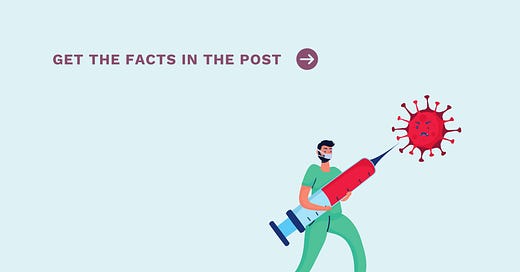By Jennifer Beam Down, PhD
Probably not. But scientists are keeping an eye on it.
This week Pfizer/BioNTech announced they will request approval in the U.S. for a 3rd dose of their current vaccine in case it is needed—which they said may be as soon as 6-12 months after full vaccination.
CDC and U.S. Food and Drug Administration officials quickly responded with a “not so fast!”, claiming there is no evidence that boosters will be required….yet.
“We are prepared for booster doses if and when the science demonstrates that they are needed,” the CDC and FDA said in a statement.
What does the science say?
Ultimately assessing the need for boosters requires time. Since we’ve only been vaccinating people in large numbers since January, we don’t yet have all the data we need for a definitive answer.
In their statement Pfizer alluded to a drop in efficacy against symptomatic disease among the vaccinated in Israel, but these data have not been fully shared (though we hear Pfizer will present the data to US officials in a meeting today). Importantly, they note that the vaccine remains highly protective against serious illness and death. Data from the UK and Canada suggest two doses of the vaccine remain protective against both symptomatic and severe disease.
The company also cited results from a booster trial of the original vaccine given six months after the second dose, which resulted in a 5-10X increase in antibodies against the original virus. While this is promising, whether such an increase is needed for protection is not obvious (for example, if you need to buy a Big Mac, $10 will work as well as $100).
New trials of a booster adapted for variants are also underway for Pfizer, Moderna, and Astrazeneca.
Other data suggests durable immunity from the vaccines, even against new variants.
Our immune system has a complex bag of tricks for remembering pathogens and springing into action when it sees them again. Besides the initial burst of antibodies, we also have longer term weapons held in reserve–specifically T cells and memory B cells.
Recent data show that both the Pfizer and Moderna vaccine induce strong memory B cell response in the lymph nodes at least 15 weeks after full vaccination. New data from Johnson and Johnson also showed strong T-cell activity 8 months after vaccination. Scientists believe this means that immunity could last for many years without need for a booster.
There is stronger evidence that a third dose might be a good idea for immunocompromised people. In a recent study, one third of solid organ transplant patients who had a lower response to two doses of the Pfizer or Moderna vaccines achieved an adequate antibody response with a third dose.
In the UK, the government announced a plan for booster shots in the autumn among those 70+ as well as anyone immunocompromised, though a final decision on this has not been made.
While we may want to boost the most vulnerable as a precaution, there are other considerations. If the original vaccines are still highly protective against severe disease and death, additional doses may not be the best use of health care resources. Much of the world is still waiting on first doses for their populations, so diverting these to 3rd doses in some countries could also slow our progress towards containing the pandemic globally.
TL;DR: How will we know when boosters are needed? Ultimately this won’t be decided by measuring antibodies or T-cells alone, but by watching how well the vaccines continue to protect people in real life. Watch this space.
Love,
Those Nerdy Girls
Further Reading:
Pfizer says it’s time for a Covid booster; FDA and CDC say not so fast
Citing the Delta Variant, Pfizer Will Pursue Booster Shots and a New Vaccine
Britain starts planning for vaccine booster shots from September
SARS-CoV-2 mRNA vaccines induce persistent human germinal centre responses
Pfizer and Moderna Vaccines Likely to Produce Lasting Immunity, Study Finds
Do I need a COVID-19 booster shot? 6 questions answered on how to stay protected:
Summary of data on vaccines in immunocompromised
IN CASE YOU MISSED IT...
CDC Updated Guidance on Schools
Excess Mortality in the U.S. in 2020
If you have a COVID question, let us know!
We read every question and use them to inform our upcoming content, though we are unable to respond to each specific question.
Dear Pandemic by Those Nerdy Girls is a 501(c)3 non-profit organization dedicated to providing credible, curated, and timely information about science and the COVID-19 pandemic. Our mission is to empower individuals to successfully navigate information overwhelm. Financial contributions help us fund our operations and are tax-deductible.



